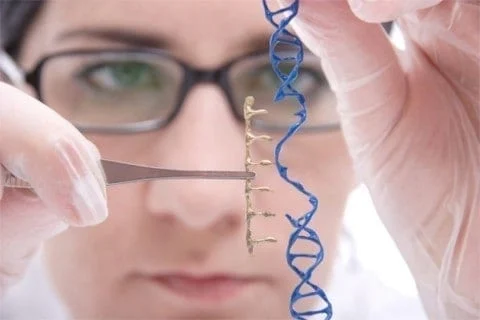Table of Contents
Introduction
Genetic engineering is a cutting-edge field that combines biology, technology, and genetics to manipulate the genetic material of living organisms. In India, the demand for skilled genetic engineers is on the rise, as advancements in biotechnology and healthcare continue to revolutionize the industry. If you have a passion for science and aspire to contribute to groundbreaking discoveries, becoming a genetic engineer might be the right career path for you.
Understanding Genetic Engineering
Genetic engineering involves altering the DNA of an organism to introduce desirable traits or eliminate undesirable ones. This process has far-reaching implications, from producing genetically modified crops to developing gene therapies for genetic diseases. Genetic engineers play a crucial role in these endeavors, making it an exciting and rewarding profession.
Educational Requirements
To embark on a journey towards becoming a genetic engineer, you need to follow a systematic educational path:
Bachelor’s Degree in Biotechnology or Related Field
Begin your academic journey with a Bachelor’s degree in biotechnology or a related field. This program will provide you with a strong foundation in biology, genetics, and biotechnology principles.
Master’s Degree in Genetic Engineering
After completing your Bachelor’s degree, pursue a Master’s degree in genetic engineering. This specialized program will delve deeper into gene editing techniques, molecular biology, and advanced genetic research.
Ph.D. for Research and Advanced Positions
For those aspiring to lead research projects and occupy advanced positions in the field, obtaining a Ph.D. in genetic engineering is essential. A doctorate will equip you with the necessary expertise to conduct original research and contribute to scientific advancements.
Skills and Qualities
Genetic engineering demands a unique set of skills and qualities:
Analytical Thinking
Genetic engineers must analyze complex genetic data and draw meaningful conclusions from their research.
Problem-Solving Abilities
They should possess strong problem-solving skills to tackle challenges and devise innovative solutions.
Attention to Detail
Precision is crucial in genetic engineering to avoid errors that may have serious consequences.
Communication Skills
Being able to communicate complex scientific concepts to non-experts is vital for collaboration and public understanding.
Teamwork and Collaboration
Genetic engineers often work in multidisciplinary teams, so the ability to collaborate effectively is essential.
Gaining Practical Experience
To strengthen your expertise and gain practical exposure in the field:
Internships and Industrial Training
Seek internships or industrial training opportunities with biotechnology companies, research institutions, or healthcare organizations.
Research Projects
Participate in research projects to deepen your understanding and build your portfolio.
Workshops and Seminars
Attend workshops and seminars to stay updated with the latest developments in genetic engineering.
Joining Professional Associations
Joining professional associations like the Indian Society of Human Genetics can provide networking opportunities and access to industry events.
Job Opportunities for Genetic Engineers
Genetic engineers can explore various industries and sectors for employment:
Research and Development
Contribute to groundbreaking research in genetics, molecular biology, and biotechnology.
Healthcare and Pharmaceuticals
Work on gene therapies and personalized medicine to improve patient outcomes.
Agriculture and Biotechnology Companies
Develop genetically modified crops with improved yields and resistance to pests and diseases.
Academia and Teaching
Pass on your knowledge by pursuing a career in academia and teaching.
Career Growth and Specialization
As a genetic engineer, you can consider the following paths for career growth and specialization:
Advanced Research
Lead research projects and publish findings in reputable scientific journals.
Specialization in Genetic Counseling
Become a genetic counselor to guide individuals and families on inherited genetic conditions.
Entrepreneurship Opportunities
Explore entrepreneurship by establishing biotech startups or genetic testing companies.
Future Scope of Genetic Engineering in India
The future of genetic engineering in India is promising. With increasing investments in biotechnology and genetic research, there will be ample opportunities for genetic engineers to make significant contributions.
Conclusion
Becoming a genetic engineer in India offers an exciting and impactful career path. By acquiring the right education, skills, and practical experience, you can contribute to groundbreaking research and innovations that shape the future of biotechnology and healthcare.
FAQs
Q- What is the role of a genetic engineer in the healthcare industry?
A- Genetic engineers in the healthcare industry focus on developing gene therapies and personalized medicine to treat genetic disorders effectively.
Q- Is genetic engineering a lucrative career option in India?
A- Yes, with the growing demand for genetic expertise, genetic engineering offers promising career prospects and competitive salaries.
Q- Can I become a genetic engineer without a Ph.D.?
A- While a Ph.D. enhances career opportunities, it is possible to find entry-level positions with a Master’s degree.
Q- Are there any ethical concerns in genetic engineering?
A- Yes, genetic engineering raises ethical considerations related to the modification of human genes and the potential consequences of genetic manipulation.
Q- How long does it take to become a genetic engineer in India?
A- It typically takes around 6 to 8 years of education and practical experience, including a Bachelor’s, Master’s, and Ph.D. programs, to become a genetic engineer in India.




